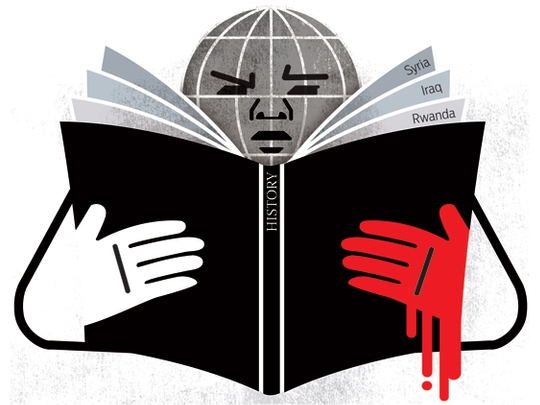
“He’ll do himself a favour if he keeps his mouth shut”, a former British diplomat told me the other day when commenting on a statement given recently by Tony Blair to BBC Radio 4. The former British prime minister has said that Iraq “would have been engulfed in a civil war like that in Syria if Britain (as a junior partner to US) had not invaded it.” The diplomat, known as one of the rapidly disappearing Arabists in the British Foreign Service, described Blair’s comment as “bordering on hallucination.”
Blair apparently also said since the Arab Spring had come to Tunisia, Libya, Egypt, Yemen and Syria, “it was going to come to Iraq — supposing you had left Saddam [Hussain] in place and you would be facing what you’re facing in Syria now in Iraq.”
Does it really matter how death is caused? This is a very simplistic reading of a devastating war situation by a man who led his country as a prime minister for almost a decade. During that time he marched along the war-mongering former US president George W. Bush into two unprecedented bloody wars in Afghanistan and Iraq.
Twenty years on, as Rwanda and the world now remember the genocide in which some 800,000 people, mainly ethnic Tutsis were massacred, we should be alarmed at the mounting numbers of the dead in both Iraq and Afghanistan and now Syria. It is hovering over the million threshold in Iraq, and increasing daily above 140,000 people in Syria.
We know in Afghanistan, that around 3,400 coalition personnel have been killed. But what about the local death toll: nobody seems to be counting. We may never know the exact number of Afghans, including several thousand innocent people, who have died since the war began in 2001. The WikiLeaks war diary, comprised of more than 91,000 secret reports on the Afghanistan War, made this sad point quite clear. The US-led campaign in Afghanistan, the diary reveals, has been undermined by the revelation that many more civilian deaths have occurred than have been officially acknowledged of the allied strikes. Politicians, such as Blair and Bush, never learn from history books. Afghanistan has never been pacified by foreign forces. Soviet Russia tried for over a decade but miserably failed. Simply said, tribes cannot be invaded.
Quick-switch politics
In 2003, the US former president was in desperate need of an ally to go into Iraq and he found one in Blair. In fact, the latter’s infamous statement in the House of Commons that year that “Saddam was only 45 minutes away from acquiring (and using) his Weapons of Mass Destruction,” was the biggest lie in modern history. This statement was, more importantly, detrimental in the decision-making process which eventually and sadly led to quick-switch politics towards the final decision to invade Iraq.
So, to read Blair’s correctly, the invasion of Iraq (and assuming Afghanistan before that), had “saved” the country from civil war. But did it save Iraq and Afghanistan from the continuously mounting daily death? Of course not. When independently established research centres in the West estimate the death in Iraq as a result of war-related causes between the US-led invasion in 2003 and mid-2011 it is about half a million and 620,000 people —a very powerful reason for alarm.
Other studies, such as the one published in the prestigious British Journal The Lancet, put the numbers at a much higher level. It says that over 600,000 Iraqis had been killed as a result of the invasion as of July 2006. Of course, death in Iraq has continued unabatedly since then. Furthermore, the estimate that over a million Iraqis have died received independent confirmation from the British polling agency, Opinion Research Business in January 2008.
Many analysts across the Atlantic have criticised both Blair and Bush for their irrational decisions to take their respected countries to “avoidable and costly conflicts.” Thirteen years on, Afghanistan is still divided on tribal basis and facing threat of civil war between mountaineers (mostly Pashtun) and city dwellers. Eleven years on, Iraq is a bloody failure. Writing in the Times recently, columnist Matthew Parris, wrote that Blair’s childlike simplicity, the gung-ho Ministry of Defence and opportunistic military chiefs “all combined to create this waste of life.”
Now, the world is merely motionlessly looking at events unfolding in Syria with the wasteful killing mercilessly continuing in Aleppo in the North, Homs in the centre, Latakia along the coast and in the capital’s neighbourhood. With the country speedily fragmented as a result of the nature of Syria’s civil war, its economy already lies in ruin. Half of Syria’s population now lives below the poverty line and this makes it unmatched anywhere in the world. Assets and infrastructure have been destroyed beyond repair. The human development index according to a recent study by the European Council for Foreign Relations, has fallen back to where it stood 37 years ago. “It is estimated that even with average annual growth rate of 5 per cent it would take nearly 30 years to recover Syria’s 2010’s GDP value.”
According to witness reports and stories one hears from various travellers from the badly hit areas, indicate an increasingly mushrooming of, what they described as, “local power houses”, in several locations in the outskirts of cities that are taking over from the traditional urban markets. This is happening on both sides of the divide. Unfortunately for the Syrian people, down-town centres or central markets are no longer available in many parts of the country. Now with no alternative in sight for survival, people have sadly become dependent on those whose interests are to simply prolong the war, particularly in areas protected by the regime’s numerous militias.
Mustapha Karkouti is a former president of the Foreign Press Association, London.









